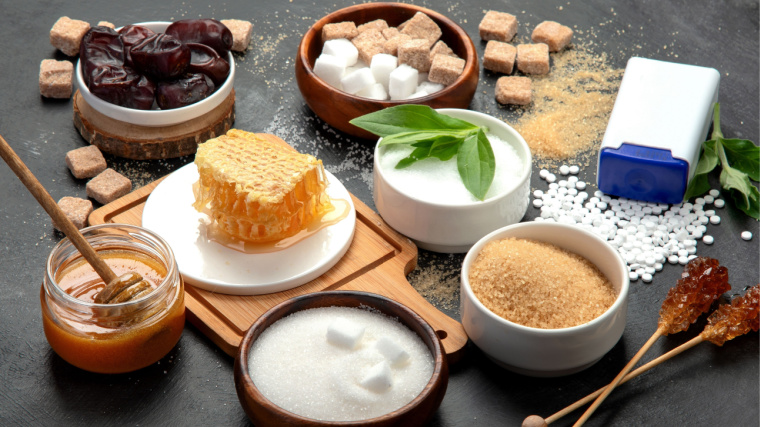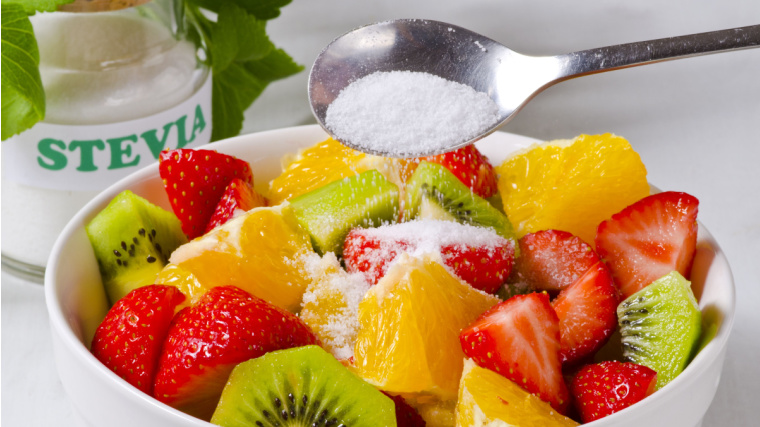On your muscle-building journey, you’ll need protein. And if you’re on the hunt for the best protein powders, we imagine you’ve scanned the labels in search of the perfect formulation. Somewhere in those ingredients, you’re likely to find artificial sweeteners.
With plenty of debate around the health implications of sugar and its substitutes, you may have come across something called erythritol. Erythritol, a sugar alcohol, is common in protein powders, but it’s by no means your everyday sugary substance. What is erythritol, exactly? Here, you’ll learn what the research says about whether this zero-calorie sweetener is too good (and sweet) to be true.
Editor’s Note: The content on BarBend is meant to be informative in nature, but it should not be taken as medical advice. When starting a new training regimen and/or diet, it is always a good idea to consult with a trusted medical professional. We are not a medical resource. The opinions and articles on this site are not intended for use as diagnosis, prevention, and/or treatment of health problems. They are not substitutes for consulting a qualified medical professional.
What Is Erythritol?
Erythritol is a type of sugar alcohol that became popular in Japan in 1990. Other examples of sugar alcohols, or polyols, include xylitol and sorbitol. Polyols occur naturally in watermelon, grapes, and mushrooms. They’re also in fermented foods like soy sauce and cheese. Since erythritol occurs naturally, the U.S. Food and Drug Administration (FDA) considers it a natural sweetener. (1)(2)
Erythritol is produced from the fermentation of genetically modified cornstarch. It is 70% as sweet as regular sugar (sucrose) and contains 0 calories. (2) Erythritol also cools your mouth and doesn’t have an aftertaste. (2)

These properties make it a popular additive within protein powders and the best pre-workouts, and it’s used as a natural sweetener for food products, including candies, chewing gum, baked goods, beverages, and more. When you see food products labeled as sugar-free, they often contain sugar alcohols like erythritol. (2)
Since erythritol is made through fermentation, a natural process, it’s considered more “natural” than other low-calorie sugar alcohols. Erythritol is also unique in that 60 to 90% of it gets absorbed by your small intestine, passes through your kidneys, and gets excreted through your urine. This process means it doesn’t affect your blood glucose or insulin levels. It packs a sweet taste without the blood sugar spike you could potentially experience with normal table sugar. (1)(3)(4)
Before getting excreted, erythritol can act as an antioxidant in your body by attacking free radicals and reducing oxidative stress. Its low glycemic index and antioxidant properties make it a helpful sugar substitute for people with type 2 diabetes and obesity. (1)
Nutrition Facts
Here are the nutrition facts for a 1-teaspoon, 4-gram serving of granulated erythritol crystals. (5)
- 0 calories
- 0 grams of protein
- 0 grams of fat
- 4 grams of carbohydrates
- 0 grams of sugar
Even though it has 4 grams of carbohydrates, erythritol is considered acceptable for those following a keto diet since it has a zero glycemic index. (1)
Potential Benefits of Erythritol
Erythritol, on its own, may not offer any health benefits. However, eating food products that contain erythritol rather than regular sugar or other sugar substitutes may be beneficial. Evidence shows it can help with fat loss, doesn’t spike your blood sugar, and may function as an antioxidant. It can also potentially protect your oral health.
May Help With Fat Loss
Consuming food products with erythritol as an alternative sweetener to sugar may help with fat loss in two ways. First, it’s a 0-calorie sweetener. If your goal is weight loss, theoretically, you need to consume less calories than you burn. Cutting down on calories in sweet food products may help you lower your caloric intake without feeling restricted. Erythritol is also commonly found in low-calorie and sugar-free food products.
[Related: Artificial Sweeteners Help Reduce Fat Mass]
The second way erythritol can help with weight loss is that it may help increase satiety or feelings of fullness, which can help you stick to your plan when trying to reduce your intake. (4)
The Science of Erythritol and Fat Loss
Research shows that erythritol increases the production of two gut hormones — glucagon-like peptide-1 (GLP-1) and cholecystokinin (CCK). These hormones signal feelings of fullness or satiety to your brain and help slow gastric emptying — the time it takes for your stomach to feel empty. (4)
Clinical trials show that lean participants taking 10 to 50 grams of erythritol had higher gut hormone releases (GLP-1 and CCK) and slower gastric emptying than the placebo group. (4)
Multiple human trials have also shown that erythritol stimulates gut hormone production, which can help increase satiety, reduce intake, and help reduce body weight. (2)

Another clinical trial compared participants consuming an erythritol-sweetened beverage with an aspartame-sweetened beverage. Aspartame is a low-calorie sweetener but not a sugar alcohol like erythritol. The results showed that the erythritol group also secreted less of the hormone ghrelin, which signals hunger to your brain. (2)
Lastly, a study was done on lean people and people with obesity comparing the effects of erythritol, xylitol, and glucose (regular sugar). The erythritol and xylitol groups had increased GLP-1 and CCK levels, and a decreased gastric emptying rate. (6) However, both groups reported the same subjective feelings of hunger as the glucose group. So, while erythritol and xylitol secrete more hormones that theoretically may make you feel more full, participants didn’t report lower feelings of hunger. (6)
Doesn’t Spike Blood Sugar
Aside from calories and feelings of hunger, erythritol has a major benefit over regular sugar and other sugar alternatives — it does not affect your insulin levels.
Your body can’t metabolize most of erythritol. It passes through your system without getting absorbed by your blood, so it has no chance to spike your blood sugar or insulin levels. Studies have backed these findings, which makes erythritol a good sugar alternative for people with type 2 diabetes or anyone looking to watch their blood sugar levels. (1)
In the previously-mentioned study on erythritol and xylitol, xylitol slightly affected insulin levels and erythritol had zero effect. Other studies also show that erythritol has zero effect on blood glucose and insulin levels. Further studies on people with and without obesity and diabetes also suggest that erythritol doesn’t affect levels of blood glucose and insulin. (2)(4)(6)
May Protect Oral Health
Too much sugar can harm your teeth, but research finds that erythritol may help prevent tooth decay. Erythritol can prevent the bacteria streptococcus mutans from binding to teeth, which is known to cause tooth decay and cavities. (3)
Over 50 years of studies have shown that sorbitol and xylitol help protect oral health better than regular sugar. Recent studies show that erythritol is even better. In clinical studies, children, teenagers, and adults consuming candies or chewing gum with erythritol had less dental plaque. (2)
[Related: Artificial Sweeteners Problems]
Other oral health studies have shown that erythritol reduces dental plaque, bacteria development, and cavities more than sorbitol and xylitol. This may be due to its “osmotic effect,” meaning it can break through a cell membrane to slow the growth of bacteria. (7)
May Have Antioxidant Properties
Erythritol may function as an antioxidant, as well. Before it gets excreted from your body, it may be able to hunt down free radicals. (1)
Free radicals are unstable molecules that are missing electrons. They cause oxidative stress and inflammation by scavenging your other cells to take their electrons. Antioxidants give electrons back to damaged cells. This process can heal cellular damage and repair DNA. (8)
People with type 2 diabetes tend to have high levels of oxidative stress and chronic inflammation. Research shows that erythritol may have a positive effect on people with type 2 diabetes.
In addition to not spiking their blood sugar, erythritol may help reduce oxidative stress, relax their blood vessels, and improve their endothelial functions. (7) Other studies suggest erythritol is a beneficial antioxidant for people with type 2 diabetes to reduce vascular damage, possibly because it is easy to get a lot of it through their diets. (9)(10)
Chronic inflammation, as it relates to diseases, differs from temporary inflammation caused by exercise. That said, if erythritol works as an antioxidant by reducing inflammation, having it in your protein powder may help with such aspects as muscle recovery.
Is Erythritol Safe?
Yes, erythritol is considered safe. In 2000, the World Health Organization (WHO) declared erythritol safe. In 2001, the FDA added erythritol to their “GRAS” (Generally Recognized as Safe) list. The FDA approved erythritol as a safe sweetener to add to food products. (2)(11)
Before FDA approval, multiple studies on humans and animals demonstrated that it was safer and easier to digest than other polyols since it gets instantly absorbed and later excreted without affecting your blood. (10)

[Related: Healthy Diet Adds Years to Your Life]
However, the long-term effects of erythritol are unknown. A study published in 2023 found that consuming erythritol may be associated with sudden cardiac events like heart attacks and thrombosis (blood clots). The study notes that there needs to be more research on long-term effects, though. (12)
Potential Erythritol Side Effects
Though considered safe by the WHO and the FDA, erythritol could still cause side effects. Sugar alcohols are known to cause digestive issues since they are poorly absorbed. Erythritol and other sugar alcohols may have a laxative effect and can cause nausea, gas, and bloating in certain individuals. (2)
However, xylitol seems to trigger more digestive side effects than erythritol. A study showed that when consuming between 35 and 50 grams of xylitol or erythritol, the xylitol group had diarrhea and the erythritol group did not. At 50 grams of erythritol, participants experienced some nausea, while 50 grams of xylitol triggered significantly more diarrhea. (13)
What the Science Says About Artificial Sweeteners
The FDA lists several artificial sweeteners as GRAS (Generally Recognized as Safe). High-intensity sweeteners like aspartame, saccharin, sucralose, stevia, and monk fruit have all been given the GRAS label. Erythritol belongs to the sugar alcohol family. Sugar alcohols, including erythritol, sorbitol, xylitol, maltitol, and mannitol, have all been labeled GRAS. (14)
For a food additive like an artificial sweetener or sugar alcohol to receive GRAS approval by the FDA, scientists must declare that the product is reasonably sure not to cause harm when used as intended. (14)
Erythritol Vs. Other Sugar Substitutes
OK, so we’ve outlined erythritol’s potential benefits and drawbacks, but are they worth it in comparison to other sweeteners commonly found in supplements and foods? Read below to see how this 0-calorie sweetening agent compares to other popular sugar substitutes you’re likely to come across when reading through labels.
Regular Sugar
One of the biggest comparisons you can make when looking to use erythritol is regular sugar. As stated above, erythritol is a better option for those on a weight loss journey — there are no calories in its composition, whereas regular sugar contains 4 calories. (1) Additionally, erythritol is non-glycemic, meaning it won’t lead to blood sugar spikes or insulin or glucose level increases. (2)(4) Finally, erythritol can be better for your oral health given its ability to help protect against tooth decay — something regular sugar definitely won’t do. (3)
Xylitol
As another sugar alcohol, xylitol is very comparable to erythritol in that it has fewer calories than regular sugar and could potentially be a great substitute for those looking to bolster their oral health. (2)(7) However, xylitol does carry roughly 2.5 calories per 1 gram, whereas erythritol has none. Plus, studies have shown that xylitol can lead to more GI distress than erythritol when consumed regularly. (13) Xylitol can also have an impact on insulin levels — a potential cause for concern for athletes with diabetes searching for a worthwhile sugar substitute.
[Related: How Exercise Affects How the Body Uses Sugar]
Aspartame
Aspartame is a popular artificial sweetener composed of two amino acids. If you’re looking for a truly sweet alternative to the original, aspartame could be your answer — the fine powder is 200 times sweeter than sucrose yet still contains 0 calories. (15) Aspartame breaks down at higher temperatures, making it less ideal for cooking or baking practices.
The WHO has classified aspartame as a possible carcinogen on the basis of limited evidence for cancer in humans. (16) This new classification does not alter the already-established acceptable daily intake of 0 to 40 milligrams per kilogram of body weight per day, though. (17) In short, aspartame is still safe to consume, but excessive consumption could be problematic (which, in reality, is the case for anything).
Stevia
Stevia can be an excellent alternative to regular sugar. Like erythritol, stevia is virtually calorie-free and can be used in a wide range of products, including the best protein bars, protein powders, and more. (18) However, stevia is sweeter than regular sucrose and can leave athletes with an off-putting aftertaste. Both are optimal solutions for those with type 2 diabetes, too, as erythritol and stevia do not have an influence on blood sugar levels. (1)(18)
Too Sweet to Be True?
Erythritol is a sugar alcohol commonly found in sugar-free and low-calorie products as a natural sugar replacement. It has 0 calories and maintains 70% of the sweet taste of regular sugar without an aftertaste. It doesn’t spike your blood sugar levels and may even help protect your oral health by preventing tooth decay.
The FDA declares it safe, but recent studies suggest a possible long-term link between erythritol and cardiac events. (12) It may be something to keep in mind as you check the ingredients on your next tub of protein powder or other go-to supplements.
FAQs: What Is Erythritol?
What does erythritol do to your body?
Your body doesn’t metabolize erythritol. It passes through your kidneys and gets excreted through your urine.
Is erythritol natural or artificial?
Erythritol is considered natural since it is found in fruits and vegetables. As a food additive, it gets produced by fermenting cornstarch.
Is erythritol available in stores?
Yes, you can get granulated or powdered erythritol in stores.
What is the difference between erythritol and xylitol?
They are both sugar alcohols, but xylitol has a few calories and some impact on your blood sugar. Erythritol has zero calories and does not affect your blood sugar levels.
Is erythritol safe for athletes with diabetes?
Erythritol seems to be safe for people with diabetes since it does not affect your blood glucose or insulin levels.
Is erythritol gluten-free?
Yes, erythritol is gluten-free.
References
- Regnat K, Mach RL, Mach-Aigner AR. Erythritol as sweetener-wherefrom and whereto? Appl Microbiol Biotechnol. 2018 Jan;102(2):587-595.
- Mazi TA, Stanhope KL. Erythritol: An In-Depth Discussion of Its Potential to Be a Beneficial Dietary Component. Nutrients. 2023 Jan 1;15(1):204.
- de Cock P, Mäkinen K, Honkala E, Saag M, Kennepohl E, Eapen A. Erythritol Is More Effective Than Xylitol and Sorbitol in Managing Oral Health Endpoints. Int J Dent. 2016;2016:9868421.
- Wölnerhanssen BK, Drewe J, Verbeure W, le Roux CW, Dellatorre-Teixeira L, Rehfeld JF, Holst JJ, Hartmann B, Tack J, Peterli R, Beglinger C, Meyer-Gerspach AC. Gastric emptying of solutions containing the natural sweetener erythritol and effects on gut hormone secretion in humans: A pilot dose-ranging study. Diabetes Obes Metab. 2021 Jun;23(6):1311-1321.
- 100% Pure Erythritol Crystals. U.S. Department of Agriculture. FoodData Central.
- Wölnerhanssen BK, Cajacob L, Keller N, Doody A, Rehfeld JF, Drewe J, Peterli R, Beglinger C, Meyer-Gerspach AC. Gut hormone secretion, gastric emptying, and glycemic responses to erythritol and xylitol in lean and obese subjects. Am J Physiol Endocrinol Metab. 2016 Jun 1;310(11):E1053-61.
- (2018). Erythritol Functional Roles in Oral-Systemic Health. Advances in Dental Research.
- Pham-Huy LA, He H, Pham-Huy C. Free radicals, antioxidants in disease and health. Int J Biomed Sci. 2008 Jun;4(2):89-96.
- den Hartog GJ, Boots AW, Adam-Perrot A, Brouns F, Verkooijen IW, Weseler AR, Haenen GR, Bast A. Erythritol is a sweet antioxidant. Nutrition. 2010 Apr;26(4):449-58.
- Boesten, DaniëlleM & Hartog, Gertjan & Decock, Peter & Bosscher, Douwina & Bonnema, Angela & Bast, Aalt. (2015). Health effects of erythritol. Nutrafoods. 14. 1-7.
- U.S. Food and Drug Administration. “GRAS Notices. Basic Search: Erythritol.”
- Witkowski M, Nemet I, Alamri H, Wilcox J, Gupta N, Nimer N, Haghikia A, Li XS, Wu Y, Saha PP, Demuth I, König M, Steinhagen-Thiessen E, Cajka T, Fiehn O, Landmesser U, Tang WHW, Hazen SL. The artificial sweetener erythritol and cardiovascular event risk. Nat Med. 2023 Mar;29(3):710-718.
- Storey D, Lee A, Bornet F, Brouns F. Gastrointestinal tolerance of erythritol and xylitol ingested in a liquid. Eur J Clin Nutr. 2007 Mar;61(3):349-54.
- U.S. Food and Drug Administration. “High-Intensity Sweeteners.” 14 May, 2014.
- Bailey, D. (2023, February 9). The truth about aspartame side effects. Healthline. https://www.healthline.com/health/aspartame-side-effects
- World Health Organization. (2023, July 14). Aspartame hazard and risk assessment results released. World Health Organization. https://www.who.int/news/item/14-07-2023-aspartame-hazard-and-risk-assessment-results-released
- World Health Organization. (n.d.). Aspartame. World Health Organization. https://apps.who.int/food-additives-contaminants-jecfa-database/Home/Chemical/62
- Patel, S., & Navale, A. (2024). The natural sweetener stevia: An updated review on its phytochemistry, health benefits, and anti-diabetic study. Current Diabetes Reviews, 20(2). https://pubmed.ncbi.nlm.nih.gov/37138480/